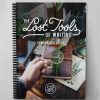Your bag is empty
Don't miss out on great deals! Start shopping or Sign in to view products added.
Shop What's New Sign in$49.95
Available in stock
What You’ll Find in LTW: Comparison Essay
• A focus on the common topic of comparison
• Comparing for understanding or for assessment
• Understanding a new kind of writing after the persuasive essay
• Foundational metaphor plus more complex metaphors
• Plenty of review
All-in-one combination Student Workbook/Teacher Guide. LTW: Comparison Essays does not have a separate teacher guide.
Welcome to The Lost Tools of Writing: Comparison Essay. This semester-long program provides a way for students to gain more practice in foundational thinking skills plus practice in writing a different kind of essay. Through LTW: Comparison Essays, students will solidify the foundations laid in LTW I, develop deeper thinking skills, master an additional form of essay-writing, and delve more deeply into analogical thinking with different kinds of metaphor-writing. The skills students gain through LTW: Comparison Essay extend beyond academics to life in the world, cultivating more refined and careful thinking about people, things, ideas, and their own decisions.
LTW: Comparison Essays fulfills the purpose of understanding people, things, or ideas more deeply, or assessing whether one is better or in some way more desirable than another. The bigger purpose of these thinking and writing skills is to grow in wisdom and prudence by practicing making finer distinctions and better decisions. Students can learn and practice principles and habits of decision-making for their own lives.
Deeper Thinking
The goal of using the common topics is not to think about the topics, but to think with them. Just as repeated practice allows a player to throw a football without thinking about how to grip it or a musician to play a piece of music without thinking of where to put her fingers, repetition allows us to internalize thinking skills so that we can put our focus where it needs to be: on the people and things in our decisions. Internalizing the means of thinking frees us to think about about our decisions and the people, places, and things that are in them—to think with the tools and not about them.
A Different Kind of Writing
By writing comparison essays after persuasive essays, students will be able to compare the two kinds of writing to each other. They will find that all writing requires coming up with something to say (invention), organizing the material (arrangement), and expressing ideas in a fitting way (elocution). Further, they will see that the common topics and elocution tools they learned in Level I have prepared them to complete any kind of writing. As long as they are given an outline (those forms that come to us by tradition and make each kind of writing what it is) they can execute any kind of writing.
The Overall Picture of a Comparison Outline
When we compare two items we can do so for different reasons. Sometimes we want to assess which one is better than the others. But sometimes, as is often the case with studies in history and literature (and friendships), we simply desire to gain a deeper understanding of both people. Comparison essays can help us gain understanding.
Sometimes we compare because we do need to choose one thing over the other. We can only attend one college, play a limited time in a recital, and eat one meal for lunch. Comparing can help us find the similarities and differences we need to know in order to decide which choice is best. Also, deciding repeatedly about our writing hones our ability to make wise decisions when they matter in our lives. Comparison essays cultivate that skill.
Outlines
Three outlines are presented in this book of comparison essays. The first is simple; then complexity builds with each successive outline. The third outline is repeated in Essay Four to allow for more practice with the most difficult form. You will find the block outline used when comparing is for the purpose of further understanding. The point-by-point outline is used when we make an assessment about which item is better.
Elocution
Elocution begins with a review of Level I’s metaphor lesson. Succeeding lessons build on that foundation, leading the students to create the more complex expanded metaphor, leading them into more and more analogical thinking.
All the skills that students learned in every canon of Level I can be applied in these comparison essays since Level I skills are universal thinking, organizing, and writing skills. Sometimes the review will be more obvious and sometimes less so. But in LTW: Comparison Essay you will be led through a way to expand on Level I skills through a different kind of writing with many lessons and benefits of its own.
| Weight | .5 kg |
|---|---|
| Dimensions | 8.5 × 11 × 1 in |
| Published Date | 2020 |
| Author | Circe Institute |
| Publisher | Circe Institute |
| Format | Spiral bound |

Reviews
There are no reviews yet